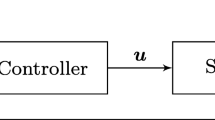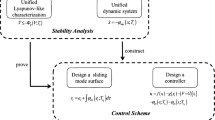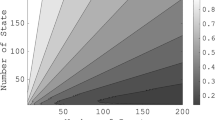Abstract
This paper is concerned with the event-triggered output feedback robust model predictive control (RMPC) for time-varying discrete-time systems via networks with data quantization, packet loss and bounded disturbance. An observer-based event-triggered scheme is introduced according to the error between the estimated state at the current time and the latest event-triggered state. The overall designed controller consists of two components, a state observer which is offline designed by using the notion of robust positively invariant (RPI) set, and an online RMPC optimization problem which minimizes the upper bound of the expect value of the infinite horizon performance cost based on the obtained estimated state. Applying the S-procedure and the sufficient conditions of RPI sets, a constraint tightening method of estimated error bound is utilized to ensure the recursive feasibility of RMPC optimization problem. An example is performed to illustrate the availability of the developed technique.
Similar content being viewed by others
References
T. Sun, Y. Pan, J. Zhang, and H. Yu, “Robust model predictive control for constrained continuous-time nonlinear systems,” International Journal of Control, vol. 91, no. 2, pp. 359–368, January 2018.
A. Bakeer, M. A. Ismeil, and M. Orabi, “A powerful finite control set-model predictive control algorithm for quasi Z-source inverter,” IEEE Transactions on Industrial Informatics, vol. 12, no. 4, pp. 1371–1379, August 2016.
M. V. Kothare, V. Balakrishnan, and M. Morari, “Robust constrained model predictive control using linear matrix inequalities,” Automatica, vol. 32, no. 10, pp. 440–444, October 1996.
F. Tahir and I. M. Jaimoukha, “Causal state-feedback parameterizations in robust model predictive control,” Automatica, vol. 49, no. 9, pp. 2675–2682, September 2013.
F. Tahir and I. M. Jaimoukha, “Robust feedback model predictive control of constrained uncertain systems,” Journal of Process Control, vol. 23, no. 2, pp. 189–200, February 2013.
V. Ghaffari, S. V. Naghavi, and A. A. Safavi, “Robust model predictive control of a class of uncertain nonlinear systems with application to typical CSTR problems,” Journal of Process Control, vol. 23, no. 4, pp. 493–499, April 2013.
P. Ojaghi, N. Bigdeli, and M. Rahmani, “An LMI approach to robust model predictive control of nonlinear systems with state-dependent uncertainties,” Journal of Process Control, vol. 47, pp. 1–10, November 2016.
F. A. Cuzzola, J. C. Geromel, and M. Morari, “An improved approach for constrained robust model predictive control,” Automatica, vol. 38, no. 7, pp. 1183–1189, July 2002.
B. Ding, Y. Xi, and S. Li, “A synthesis approach of on-line constrained robust model predictive control,” Automatica, vol. 40, no. 1, pp. 163–167, January 2004.
B. Kouvaritakis, J. A. Rossiter, and J. Schuurmans, “Efficient robust predictive control,” IEEE Transactions on Automatic Control, vol. 45, no. 8, pp. 1545–1549, August 2000.
Z. Wan and M. V. Kothare, “A computationally efficient formulation of robust model predictive control using linear matrix inequalities,” Automatica, vol. 39, no. 5, pp. 837–846, January 2002.
J. Chen, S. Meng, and J. Sun, “Stability analysis of networked control systems with aperiodic sampling and time-varying delay,” IEEE Transactions on Cybernetics, vol. 47, no. 8, pp. 2312–2320, August 2017.
D. Wu, X. M. Sun, Y. Tan, and W. Wang, “On designing event-triggered schemes for networked control systems subject to one-step packet dropout,” IEEE Transactions on Industrial Informatics, vol. 12, no. 3, pp. 902–910, June 2016.
J. Qiu, H. Gao, and S. X. Ding, “Recent advances on fuzzy-model-based nonlinear networked control systems: A survey,” IEEE Transactions on Industrial Electronics, vol. 63, no. 2, pp. 1207–1217, February 2016.
B. Tang, G. P. Liu, and W. H. Gui, “Improvement of state feedback controller design for networked control systems,” IEEE Transactions on Circuits and Systems II: Express Briefs, vol. 55, no. 5, pp. 464–468, May 2008.
X. Zhu and G. H. Yang, “State feedback controller design of networked control systems with multiple-packet transmission,” International Journal of Control, vol. 82, no. 1, pp. 86–94, January 2009.
L. Zhang, Y. Shi, T. Chen, and B. Huang, “A new method for stabilization of networked control systems with random delays,” IEEE Transactions on Automatic Control, vol. 50, no. 8, pp. 1177–1181, August 2005.
M. C. F. Donkers, W. P. M. H. Heemels, D. Bernardini, A. Bemporad, and V. Shneer, “Stability analysis of stochastic networked control systems,” Automatica, vol. 48, no. 5, pp. 917–925, May 2012.
J. Mu, G. P. Liu, and D. Rees, “Design of robust networked predictive control systems,” Proc. of American Control Conference, vol. 1, pp. 638–643, 2005.
B. Xue, N. Li, S. Li, and Q. Zhu, “Robust model predictive control for networked control systems with quantisation,” IET Control Theory and Applications, vol. 4, no. 12, pp. 2896–2906, December 2010.
T. Q. Dinh, K. K. Ahn, and J. Marco, “A novel robust predictive control system over imperfect networks,” IEEE Transactions on Industrial Electronics, vol. 64, no. 2, pp. 1751–1761, February 2017.
Y. Zou, J. Lam, Y. Niu, and D. Li, “Constrained predictive control synthesis for quantized systems with Markovian data loss,” Automatica, vol. 55, pp. 217–225, May 2015.
X. Tang and B. Ding, “Model predictive control of linear systems over networks with data quantizations and packet losses,” Automatica, vol. 49, no. 5, pp. 1333–1339, May 2013.
X. Wang and M. D. Lemmon, “Event-triggering in distributed networked control systems,” IEEE Transactions on Automatic Control, vol. 56, no. 3, pp. 586–601, March 2011.
L. Yao, Z. Wang, X. Huang, Y. X. Li, H. Shen, and G. R. Chen, “Aperiodic sampled-data control for exponential stabilization of delayed neural networks: A refined two-sided looped-functional approach,” IEEE Transactions on Circuits and Systems II: Express Briefs, vol. 67, no. 12, pp. 3217–3221, December 2020.
Z. L. Yan, X. Huang, Y. J. Fan, J. W. Xia, and H. Shen, “Threshold-function-dependent quasi-synchronization of delayed memristive neural networks via hybrid event-triggered control,” IEEE Transactions on Systems, Man, and Cybernetics: Systems, vol. 51, no. 11, pp. 6712–6722, 2021.
Z. L. Yan, X. Huang, and J. D. Cao, “Variable-sampling-period dependent global stabilization of delayed memristive neural networks based on refined switching event- triggered control,” Science China Information Sciences, vol. 63, no.11, November 2020.
Y. Xu, M. Fang, Z. G. Wu, Y. J. Pan, M. Chadli, and T. W. Huang, “Input-based event-triggering consensus of multiagent systems under denial-of-service attacks,” IEEE Transactions on Systems, Man, and Cybernetics: Systems, vol. 50, no. 4, pp. 1455–1464, April 2020.
G. Wang, M. Chadli, H. H. Chen, and Z. J. Zhou, “Event-triggered control for active vehicle suspension systems with network-induced delays,” Journal of the Franklin Institute, vol. 356, no. 1, pp. 147–172, January 2019.
Z. P. Wang, H. N. Wu, and M. Chadli, “H sampled-data fuzzy observer design for nonlinear parabolic PDE systems,” IEEE Transactions on Fuzzy Systems, vol. 29, no. 5, pp. 1262–1272, 2021.
H. Li and Y. Shi, “Event-triggered robust model predictive control of continuous-time nonlinear systems,” Automatica, vol. 50, no. 5, pp. 1507–1513, April 2014.
F. D. Brunner, W. P. M. H. Heemels, and F. Allgöwer, “Robust event-triggered MPC with guaranteed asymptotic bound and average sampling rate,” IEEE Transactions on Automatic Control, vol. 62, pp. 5694–5709, 2017.
D. Wu, X. M. Sun, C. Wen, and W. Wang, “Redesigned predictive event-triggered controller for networked control system with delays,” IEEE Transactions on Cybernetics, vol. 46, no. 10, pp. 2195–2206, October 2017.
Y. Zhao, H. Gao, and T. Chen, “Fuzzy constrained predictive control of non-linear systems with packet dropouts,” IET Control Theory and Applications, vol. 4, no. 9, pp. 1665–1677, 2010.
A. Alessandri, M. Baglietto, and G. Battistelli, “On estimation error bounds for receding-horizon filters using quadratic boundedness,” IEEE Transactions on Automatic Control, vol. 49, no. 8, pp. 1350–1355, August 2004.
M. Fu and L. Xie, “The sector bound approach to quantized feedback control,” IEEE Transactions on Automatic Control, vol. 50, no. 11, pp. 1698–1711, November 2005.
B. Ding and H. Pan, “Output feedback robust MPC for LPV system with polytopic model parametric uncertainty and bounded disturbance,” International Journal of Control, vol. 89, no. 8, pp. 1554–1571, February 2016.
J. You, S. Yin, and H. Gao, “Fault detection for discrete systems with network-induced nonlinearities,” IEEE Transactions on Industrial Informatics, vol. 10, no. 4, pp. 2216–2223, November 2014.
Funding
We acknowledge funding received from the Key Research Program of the Science Foundation of Shandong Province (ZR2020KE001); This is also a publication of the Enroll Plan of Young Innovative Talents of Shandong Province (Big Data and Ecological Security Research and Innovation Team Project).
Author information
Authors and Affiliations
Corresponding author
Additional information
Conflict of Interests
The author declares that there is no conflict of interest.
Hongchun Qu received his Ph.D. degree from Iowa State University in 2009. He is currently a Professor at the College of Information Science and Eengineering, Zaozhuang University. His research interest covers model predictive control, computer modeling and simulation, predictive modeling as well as bigdata.
Publisher’s Note
Springer Nature remains neutral with regard to jurisdictional claims in published maps and institutional affiliations.
Rights and permissions
About this article
Cite this article
Qu, H. An Event-triggered Output Feedback Robust MPC Scheme for Time-varying System with Packet Loss and Bounded Disturbance. Int. J. Control Autom. Syst. 20, 1087–1098 (2022). https://doi.org/10.1007/s12555-020-0860-4
Received:
Revised:
Accepted:
Published:
Issue Date:
DOI: https://doi.org/10.1007/s12555-020-0860-4




